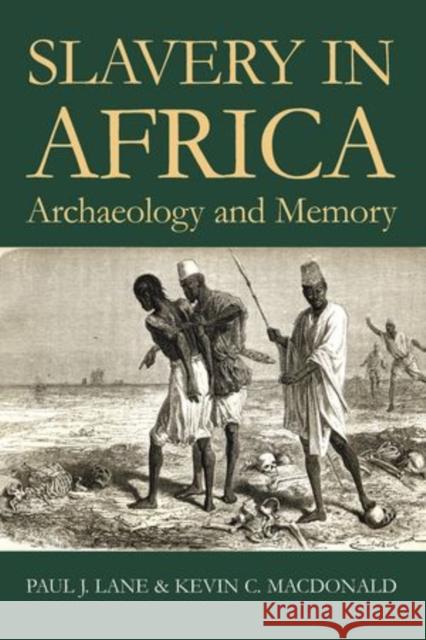Comparative Dimensions of Slavery in Africa: Archaeology and Memory » książka
Comparative Dimensions of Slavery in Africa: Archaeology and Memory
ISBN-13: 9780197264782 / Angielski / Twarda / 2012 / 352 str.
The role and consequences of slavery in the history of Africa have been brought to the fore recently in historical, anthropological and archaeological research. Public remembrances - such as Abolition 2007 in Great Britain, which marked the bicentenary of the Abolition of the Slave Trade Act and which this volume also commemorates - have also stimulated considerable interest. There is a growing realisation that enslavement, whether as part of a sliding scale of 'rights in persons' or due to acts of violence, has a history on the African continent that extends back in time long before the Trans-Atlantic slave trade.
The nature of such enslavement is obscured by the lack of resolution in historical sources before the middle of the second millennium AD. Ground-breaking archaeological research is now building models for approaching slave labour systems via collaboration with historians and the critical scrutiny of historical data. Generally, such new research focuses at the landscape scale; rather than attempting to find physical evidence of slavery per se, it assesses the settlement systems of slavery-based economies, and the depopulation and abandonment which followed from wars of enslavement. The potential utility of this work is considerable, and is ultimately the only means whereby researchers will be able to resolve the many 'chicken-or-egg' issues which beset the historical study of slavery in Africa.
Recent decades have also witnessed an increase in attempts to commemorate and memorialise slavery on the African continent, through a combination of museum displays, historic site interpretation and public history projects. Unfortunately, there are still very few critical discussions of relevant case studies of this kind of public archaeology across the continent, and few examples of good practice. This volume addresses this lack by offering a selection of papers on recent archaeological studies of slavery, slave resistance and their contemporary commemoration, alongside archaeological assessments of the economic, environmental and political consequences of slave trading in a variety of historical and geographical settings.
The role and consequences of slavery in the history of Africa have been brought to the fore recently in historical, anthropological and archaeological research. Public remembrances - such as Abolition 2007 in Great Britain, which marked the bicentenary of the Abolition of the Slave Trade Act and which this volume also commemorates - have also stimulated considerable interest. There is a growing realisation that enslavement, whether as part of a sliding scale of 'rights in persons'or due to acts of violence, has a history on the African continent that extends back in time long before the Trans-Atlantic slave trade.The nature of such enslavement is obscured by the lack of resolution in historical sources before the middle of the second millennium AD. Ground-breaking archaeological research is now building models for approaching slave labour systems via collaboration with historians and the critical scrutiny of historical data. Generally, such new research focuses at the landscape scale; rather than attempting to find physical evidence of slavery per se, it assesses the settlement systems ofslavery-based economies, and the depopulation and abandonment which followed from wars of enslavement. The potential utility of this work is considerable, and is ultimately the only means whereby researchers will be able to resolve the many 'chicken-or-egg' issues which beset the historical study of slavery inAfrica.Recent decades have also witnessed an increase in attempts to commemorate and memorialise slavery on the African continent, through a combination of museum displays, historic site interpretation and public history projects. Unfortunately, there are still very few critical discussions of relevant case studies of this kind of public archaeology across the continent, and few examples of good practice. This volume addresses this lack by offering a selection of papers on recent archaeologicalstudies of slavery, slave resistance and their contemporary commemoration, alongside archaeological assessments of the economic, environmental and political consequences of slave trading in a variety of historical and geographical settings.











